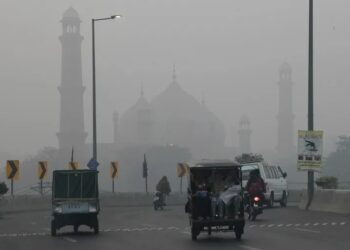Written by: Abdul Basit Alvi
Balochistan, Pakistan’s largest province, holds immense strategic, economic, and geopolitical significance. Covering an area of 347,190 square kilometers, it makes up nearly 44% of the country’s total landmass, yet it is home to only around 5% of Pakistan’s population. Despite its smaller population, Balochistan’s importance far surpasses its demographic size, owing to its abundant natural resources, strategic location, and central role in regional and international geopolitics.
The province’s geographic position makes it crucial for Pakistan’s security and economic prospects. Located in the southwestern part of the country, it shares borders with Afghanistan and Iran, and boasts a long coastline along the Arabian Sea. Positioned at the crossroads of Central Asia, the Middle East, and South Asia, Balochistan serves as a key geopolitical asset for Pakistan. Its most valuable strategic feature is the Gwadar Port, situated along the Makran coast. Gwadar is one of the most significant deep-water ports in the region and is poised to play a central role in the China-Pakistan Economic Corridor (CPEC), a major infrastructure project connecting Gwadar to China’s Xinjiang region. As part of CPEC, Gwadar is being transformed into a major trade and energy hub, with the potential to reshape Pakistan’s economy. The port provides Pakistan with direct access to international shipping routes, greatly reducing transportation time and costs between the Middle East, Central Asia, and China. For China, it offers an alternative to the traditional Malacca Strait, a key shipping route often affected by geopolitical tensions. Gwadar could also emerge as a vital transshipment port, boosting Pakistan’s trade ties with the Gulf, Europe, and Africa. Additionally, the port could enhance Pakistan’s energy security by facilitating the transport of oil and gas from the Middle East to energy-consuming regions like Central Asia and China. This would diversify Pakistan’s energy supply routes and lessen its reliance on traditional maritime pathways passing through the Strait of Hormuz.
The stability of Balochistan is also directly tied to Pakistan’s national security. The province’s proximity to Afghanistan, Iran, and India makes it a critical area for border defense. Balochistan is a frontline region in Pakistan’s efforts to combat terrorism, insurgency, and cross-border militancy. The presence of various insurgent groups in the region has posed significant challenges to Pakistan’s security forces. However, the province’s strategic importance demands that Pakistan’s military and intelligence agencies remain vigilant and proactive in securing its borders and protecting national interests.
Various national and international actors seek to destabilize Pakistan by targeting Balochistan, recognizing its immense value to the country. The province has experienced a series of terrorist attacks attributed to multiple insurgent groups, with the Baloch Liberation Army (BLA) being one of the most prominent and violent organizations involved. The BLA has been employing guerrilla tactics, bombings, targeted killings, and assaults on state infrastructure. These actions have caused significant loss of life and disrupted the region. On October 24, 2018, the BLA carried out a deadly attack on the Police Training Academy in Quetta, the capital of Balochistan. Armed militants stormed the academy, opening fire on recruits and setting off explosives. The assault resulted in the deaths of at least 61 police recruits, with dozens more wounded. The attack was one of the deadliest assaults on a Pakistani security force facility in recent years. The BLA claimed responsibility for the attack. The attack sent shockwaves through Pakistan and highlighted the ongoing threat posed by insurgent groups in the region. In May 2019, a suicide bomber targeted a convoy of Frontier Corps (FC) personnel in Turbat, a city in southern Balochistan. The attack resulted in the deaths of at least 10 security personnel and left many others injured. The BLA claimed responsibility for the bombing, which was part of their broader strategy to target Pakistani military and security forces, further destabilizing the region. The use of suicide bombings, a tactic frequently employed by the BLA, is intended to instill fear and intimidate the state apparatus in Balochistan. In April 2022, a group of BLA militants launched a attack on Chinese workers at the Gwadar port, a key infrastructure project under the China-Pakistan Economic Corridor (CPEC). The assault took place at a luxury hotel where Chinese engineers and workers were staying. The militants opened fire, killing at least four people, including two Chinese nationals. The BLA took responsibility for the attack. This assault was significant not only because of its target but also due to its international ramifications. CPEC is a vital component of the Chinese Belt and Road Initiative (BRI), and the BLA’s attack on Chinese nationals served as a warning against foreign involvement in Balochistan. The group’s opposition to economic development projects led by China and Pakistan stems from their wrong belief that these projects benefit outsiders while neglecting the rights and needs of the Baloch people. However, this perspective overlooks the fact that the Baloch people are benefiting from employment opportunities and infrastructure development.
In November 2020, BLA militants ambushed a convoy of Pakistani security forces in the Kech district of southern Balochistan. Using small arms fire and explosives, the attackers killed at least seven soldiers. The BLA’s use of hit-and-run tactics and ambushes, particularly in remote areas of Balochistan, has become a hallmark of their operations. These attacks often target military convoys, checkpoints, and personnel, intensifying the already volatile security situation in the region. One of the earliest high-profile incidents attributed to the BLA occurred in 2015, when a roadside bomb targeted a convoy of Pakistan Army vehicles in Awaran, Balochistan. The blast killed at least five soldiers and wounded several others. The BLA claimed responsibility for the attack, which involved the use of roadside bombs—a tactic that allows insurgents to inflict maximum casualties while avoiding direct confrontation, making it difficult for the Pakistani military to effectively counter.
On November 23, 2018, three BLA militants launched an attack on the Chinese consulate in Karachi, a city far from Balochistan but strategically significant due to its Chinese investments. The attackers attempted to enter the consulate compound but were repelled by security forces, resulting in the deaths of two police officers and the militants. No Chinese nationals were harmed. Although this attack occurred in Karachi, it was directly linked to the BLA’s opposition to Chinese involvement in Balochistan’s development. The assault was part of the BLA’s strategy to target Chinese interests. In addition to military and government targets, the BLA has been involved in the targeted killings of civilians, particularly those seen as collaborating with the Pakistani state. The group has reportedly assassinated local political figures, Baloch nationalists who oppose their methods, and civilians working with security forces. These killings contribute to a climate of fear and insecurity in Balochistan, with civilians often caught in the crossfire between the BLA and the Pakistani military. The BLA’s tactics, including intimidation and the assassination of those perceived as enemies, have further complicated the conflict, making it more challenging for peace efforts to succeed.
India and Afghanistan are also believed to be involved in supporting terrorism in Balochistan, backing the BLA and other militant groups. India’s alleged role in Balochistan can be traced to the long-standing strategic rivalry between the two nations, a conflict that has existed since the partition of British India in 1947. India has frequently sought to destabilize Pakistan by supporting insurgencies and separatist movements in regions like Balochistan, which Pakistan views as crucial to its territorial integrity. A significant event occurred in 2016 when Indian intelligence officer Kulbhushan Jadhav was arrested in Balochistan by Pakistan’s security forces. Jadhav, a former Indian Navy officer, was allegedly working as a spy for India’s Research and Analysis Wing (RAW) and was accused of planning attacks on Pakistani targets. During his interrogation, Jadhav confessed to funding and training Baloch separatist militants, particularly from the BLA and the BLF. His arrest escalated tensions between the two countries. Pakistan’s accusation that India is actively supporting insurgent groups in Balochistan is based on the belief that destabilizing the region could distract Pakistan from the Kashmir issue and create a broader strategic challenge for Islamabad. The Pakistani government has consistently accused India of providing financial, military, and logistical support to Baloch separatists, a claim Pakistani officials have raised in numerous international forums.
India’s public statements have also fueled suspicions about its involvement in Balochistan. In 2016, Indian Prime Minister Narendra Modi made a controversial remark during his Independence Day speech, highlighting the suffering of the Baloch people under Pakistani rule and framing their plight as a “human rights issue.” This statement was widely seen as a subtle endorsement of India’s support for the Baloch separatist cause. India’s actions in Balochistan are perceived as part of a broader strategy to weaken Pakistan by supporting insurgencies and fostering instability within its borders. Additionally, India’s diplomatic engagement with Baloch diaspora groups in Western countries has raised further concerns in Pakistan. Many Baloch nationalist leaders in exile have openly sought Indian backing for their cause. Reports suggest that Indian intelligence agencies have provided military training, weapons, and financial support to Baloch separatist groups. Pakistan claims that India’s RAW has been involved in training insurgents in Afghanistan, where Baloch militants allegedly receive military-style training in camps run by Afghan intelligence agencies. These claims are supported by the discovery of Indian weapons and ammunition in Balochistan after terrorist attacks, including bombings and ambushes by Baloch separatists.
Afghanistan’s involvement in the Balochistan conflict, while more indirect, remains significant. The relationship between Afghanistan and Pakistan has long been strained, particularly due to the disputed Durand Line border. Afghanistan has expressed hostility toward Pakistan’s control over Balochistan, with Afghan officials at times claiming that the province should belong to Afghanistan. One of the most notable aspects of Afghanistan’s role is its provision of sanctuary to Baloch insurgents. Afghanistan, especially under the previous Taliban regime and in the aftermath of the US-led invasion in 2001, has been a refuge for members of Baloch separatist groups. Baloch separatists, including members of the BLA and BLF, are reported to have used Afghan territory as a base for launching cross-border attacks into Pakistan. Afghanistan’s porous border with Pakistan complicates Pakistan’s ability to effectively monitor and prevent insurgents from crossing back and forth. In some cases, Afghan intelligence agencies have been accused of either ignoring the presence of Baloch insurgents in Afghanistan or even offering them implicit support. In the past, Afghanistan’s government, especially during periods of strained relations with Pakistan, has made statements that seemed to support Balochistan’s independence or autonomy. Afghan leaders have voiced solidarity with the Baloch people, framing their struggle as one against an oppressive Pakistani state. This rhetoric often aligns with separatist sentiments in Balochistan and contributes to the perception that Afghanistan is at least indirectly backing the insurgents. The instability in Afghanistan has further complicated the Balochistan issue. With the Taliban’s return to power in 2021, there are growing concerns that the Afghan government may once again serve as a sanctuary for insurgent groups operating in Balochistan. The lack of central authority in Afghanistan complicates Pakistan’s ability to negotiate or collaborate with the Afghan government to stop the cross-border movement of militants and resources.
On March 11, 2025, Pakistan’s security forces were thrust back into the spotlight following a major incident involving the Jaffer Express passenger train, a critical part of the country’s transport network. The attack, which led to a hostage situation, raised significant national and international concern. The Jaffer Express, one of the most frequented trains running between Karachi and Quetta, was ambushed by militants as it traveled through Balochistan, a region historically known for separatist insurgency. The attack, which occurred in the late afternoon of March 11, 2025, was a carefully coordinated operation by a faction of the Baloch Liberation Army (BLA).
As the train was traveling between Quetta and Mach, a group of insurgents attacked the train at a remote stretch of the railway track using explosives and firearms. The assailants derailed several carriages, causing panic among the passengers. The attackers then boarded the train, capturing both civilians and military personnel on board. Reports indicate passengers, including a mix of civilians and security personnel, were taken hostage. Some of the military personnel were in civilian attire for security reasons.
The insurgents employed hit-and-run tactics and ambush strategies in the execution of the attack. They placed explosives on the tracks to derail the train, a tactic that inflicts mass casualties and blocks the train’s path, preventing escape or reinforcements. After the derailment, the attackers stormed the train, threatening passengers with firearms and taking control of several carriages. They separated the military personnel from the civilians, signaling their intent to hold the hostages for negotiation purposes. This attack was not only a military strike but also a psychological one, designed to send a powerful message to the Pakistani government and military.
Following the attack, local law enforcement and emergency teams were dispatched to the scene, but the remote location and the insurgents’ use of guerrilla tactics hindered an immediate rescue operation. The militants communicated their demands through radio broadcasts, claiming responsibility for the attack and threatening to harm the hostages unless their political demands were met. The BLA has previously made similar demands for greater political autonomy for Balochistan and the withdrawal of Pakistani military forces from the region. In response, the Pakistani government, working closely with the military, moved quickly to negotiate with the attackers. However, given the failure of previous negotiations and the insurgents’ history of resorting to violence, the military began preparing for a full-scale rescue mission. As hours passed, tensions escalated, with reports suggesting that the hostage-takers were growing increasingly aggressive. Under mounting pressure to take decisive action, the Pakistani Army launched Operation at dawn the following day. The operation’s goal was to neutralize the insurgents, ensure the safe release of the hostages, and prevent further bloodshed. Leading the operation was the Special Services Group (SSG), Pakistan’s elite counter-terrorism unit, known for its expertise in hostage rescues and counter-insurgency operations. The military swiftly mobilized a combination of ground troops, armored vehicles, and helicopters to the area surrounding the derailment site. Given the mountainous terrain and the risk that insurgents might be hiding in nearby caves or hard-to-reach locations, both aerial surveillance and ground intelligence teams were deployed to track the insurgents’ positions. A key element of the strategy involved coordinating ground forces with special forces units. The SSG soldiers carried out a series of tactical operations to encircle the attackers and prepare for a precise, coordinated strike. The Pakistan Air Force also provided air support, patrolling the area to prevent any insurgents from escaping by other means. By the following morning, the military had successfully surrounded the train and its captors. The SSG launched a well-timed assault on the train, storming the carriages where the hostages were being held. The operation was largely successful. A number of militants were killed, and others were captured. However, not a single hostage lost their life. The rescue operation lasted several hours as forces moved through the train, securing the hostages and neutralizing any resistance. By midday, the Pakistani Army had successfully freed all the hostages, and the militants were killed. Following the operation, the government and the people of Pakistan praised the military’s swift action, which saved many innocent lives. However, the attack and subsequent operation underscored several ongoing security concerns in Pakistan, particularly in Balochistan.
The Pakistan Army, under the leadership of General Asim Munir, has been actively engaged in anti-terrorism and counterinsurgency operations in Balochistan. Since assuming the role of Chief of Army Staff (COAS) in November 2022, General Munir has led several successful operations aimed at neutralizing terrorist elements, restoring peace, and improving security in the region. His leadership and strategic vision have led to significant changes in Pakistan’s counterterrorism efforts, making the army a key player in stabilizing Balochistan. One of the most notable strategies under General Munir’s leadership has been a stronger focus on Intelligence-Based Operations (IBOs). These operations, carefully planned and executed, rely heavily on intelligence gathering, surveillance, and coordination among various military and intelligence agencies. General Munir’s emphasis on intelligence-driven operations has proven to be highly effective in eliminating high-value targets. Notably, under his leadership, several top insurgent commanders responsible for attacks on military personnel and civilian infrastructure were neutralized. These operations have disrupted the communication networks and logistics of terrorist groups, severely hindering their ability to carry out large-scale attacks. For example, in 2023, the Pakistan Army successfully eliminated several high-ranking members of the BLA and BLF in a series of intelligence-based operations, significantly diminishing the operational capacity of these groups. These operations also helped prevent cross-border infiltration and the movement of militants from Afghanistan into Balochistan. General Asim Munir has placed a strong emphasis on enhancing collaboration between the military, police, and intelligence agencies to bolster security efforts in Balochistan. Joint task forces have been set up to streamline coordination, leading to more effective counterterrorism operations. This integrated approach, guided by General Munir’s clear direction, has ensured that security operations are not only operationally successful but also legally robust and supported by the local community. This collaboration has led to the dismantling of terrorist cells, including the confiscation of substantial amounts of weapons and explosives intended for terrorist activities. While Operation Radd-ul-Fasaad was launched prior to General Munir’s appointment, he has continued and strengthened its implementation in Balochistan. A comprehensive counterterrorism initiative, the operation aims to eliminate terrorism, consolidate earlier successes, and achieve lasting peace across Pakistan, with a special emphasis on regions experiencing high levels of terrorist activity, such as Balochistan. Under General Munir’s leadership, Operation Radd-ul-Fasaad was expanded to target terrorist hideouts and training camps in the rugged mountainous regions of Balochistan—areas once used by militants to regroup, train, and launch attacks. Supported by air forces and Special Services Groups (SSG), the Pakistan Army conducted several operations to eliminate these strongholds. A key victory came in early 2023, when a significant number of militants were killed in an operation targeting insurgent strongholds in the Dera Bugti and Keelat regions, areas historically known for harboring insurgent groups.
Cross-border militancy remains a persistent challenge in Balochistan due to its porous borders with Afghanistan and Iran. Under General Munir’s leadership, a more robust strategy was implemented to tackle these threats. The military ramped up border security by deploying specialized forces and utilizing advanced technology to monitor border activity. There was a heightened focus on securing Balochistan’s western border with Afghanistan to prevent militants from escaping into Afghan territory or smuggling weapons and supplies into Balochistan. Increased patrols, border fencing, and surveillance systems have significantly curtailed the insurgents’ ability to operate freely.
In addition to military operations, General Munir has placed considerable emphasis on rebuilding and rehabilitating areas impacted by militancy. Restoring social stability is vital to reducing the influence of terrorist groups and fostering lasting peace in Balochistan. The Pakistan Army has undertaken various development projects aimed at supporting local populations in areas most affected by terrorism and insurgency. Infrastructure improvements—such as road construction, electricity provision, and access to clean water—have been a central part of these efforts to gain the trust and support of the local community. Notably, the army has facilitated the establishment of healthcare and education facilities in remote areas of Balochistan. This development agenda, spearheaded by General Munir, aims to create an environment where terrorism cannot flourish. By improving living standards, the army seeks to provide an alternative to insurgent groups that exploit poverty and lack of opportunities for recruitment.
General Munir’s leadership has also emphasized the importance of engaging local tribal leaders and communities. By fostering dialogue with the local Baloch population, the army has worked to bridge the gap between the state and its citizens. This engagement has proven invaluable for gathering human intelligence and preventing terrorist attacks. Additionally, the army has collaborated with local leaders to address grievances and promote national unity. By tackling issues such as unemployment, economic underdevelopment, and political marginalization, the Pakistan Army has played a key role in diminishing the influence of separatist elements. The security challenges in Balochistan are further complicated by external actors, particularly India and Afghanistan, who have been accused of supporting insurgent groups operating in the region. General Munir has adopted a firm position on combating foreign interference in Balochistan’s internal matters. Although relations with Afghanistan have traditionally been complicated, his leadership has fostered diplomatic and military collaboration between the two nations on shared security concerns. Since the Taliban’s return to power in Afghanistan, Pakistan has made efforts to prevent Baloch terrorist groups from utilizing Afghan territory for their activities. In coordination with Afghan security forces, the Pakistan Army has carried out operations targeting militants hiding in Afghanistan, preventing them from using the region as a safe haven. India’s intelligence agency, RAW (Research and Analysis Wing), has long been accused of supporting terrorist groups in Balochistan. Under General Munir’s leadership, the Pakistan Army has successfully disrupted Indian efforts by intercepting and dismantling espionage networks operating in the province. The military frequently reports the seizure of Indian-made weapons and equipment in raids on terrorist hideouts, highlighting foreign involvement in destabilizing Balochistan.
General Munir has also focused on modernizing the tactics, technology, and equipment of the Pakistan Army. The use of drones, unmanned aerial vehicles (UAVs), and advanced surveillance systems has provided the army with a tactical advantage in identifying and neutralizing terrorist threats before they can escalate. These technological advancements have significantly improved the overall security situation in Balochistan and have been widely appreciated by the people.
The Pakistan Army’s successful operation during the Jaffer Express attack sent a clear message of zero tolerance for terrorism and a firm commitment to the peace and prosperity of both Balochistan and Pakistan. These actions have earned the admiration and support of the people of Balochistan and the wider Pakistani population, who deeply appreciate the army’s efforts.

























